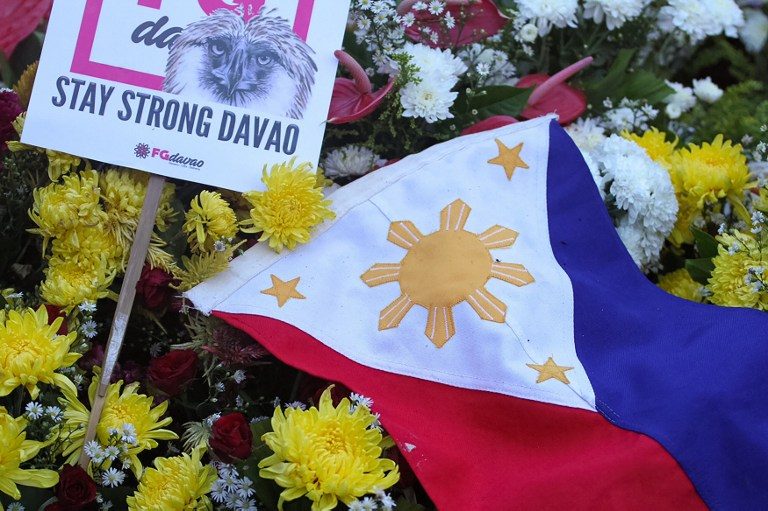SUMMARY
This is AI generated summarization, which may have errors. For context, always refer to the full article.

DAVAO CITY, Philippines – It has not always been smooth and easy in Davao City, now Mindanao’s trade and commerce hub.
Since the early 1980s, the dark days when the city was turned into a virtual “killing fields” for communist rebels, Davao has been witness to bombings of all types so that at some point, when he was still mayor, President Rodrigo Duterte would say that “bombings have been seasonal” in the city.
A total of 73 people have been killed while 551 others have been injured in 8 major explosions in the city, the latest of which was the September 2, 2016 night market blast, which killed 14 people. (For the latest updates on the Davao blast, check Rappler’s live blog.)
Below is a list of 7 past explosions to hit Davao:
April 19, 1981, Easter Sunday
Two grenades were lobbed at San Pedro Cathedral.
The bomb killed 17 churchgoers and wounded 157. It was the first bombing incident in the country after Martial Law was lifted in January 1981.
December 28, 1993, Sunday
The San Pedro Cathedral was again the target, with 3 grenades thrown inside the crowded church while Fr. Bong Dublan was saying his homily for the 6 pm Mass. He saw the grenade that was thrown but was too shocked and speechless to react.
The incident killed 6 people and wounded 151.
Eight hours after the incident, a suspected Christian militant bombed a mosque. No one was hurt.
Duterte was then on his second elective term as mayor.
May 16, 2002, Thursday
An explosion occurred inside the room of one Michael Terrence Meiring, an American, at the Evergreen Hotel. Meiring identified himself as a treasure hunter, and even joked that he was part of the “CIA.” Hotel staff told investigators that Meiring brought with him a metal box and warned them not to touch it.
The explosion broke his legs. He was later taken from the Davao Doctor’s Hospital by agents claiming to be members of the United States Federal Bureau of Investigation.
The incident angered Duterte as he criticized the United States for being disrespectful. The so-called FBI agents just barged into the hospital, ignoring questions from police authorities who were assigned to watch Meiring.
March 4, 2003, Tuesday
Unidentified men used an improvised explosive device to bomb the waiting area at the old Davao International Airport terminal, killing 22 people and wounding 155 others.
The government blamed “Muslim terror groups,” in particular Jemaah Islamiyah, for the bombing. American and Australian investigators took part in the police investigation of the incident.
The bombing happened amid controversy over the Philippines’ participation in the US-led “war on terror.”
Then President Gloria Macapagal-Arroyo created the independent Mindanao Truth Commission in October that same year to investigate the incident and other related terrorist attacks. Later that year, President George Bush visited Philippines and affirmed support for Mrs Arroyo’s anti-terror campaign in Mindanao.
April 3, 2003, Thursday
Barely a month after the Davao airport bombing, another powerful bomb exploded, this time at the entrance of Sasa Wharf.
The incident, which the government blamed on the Moro Islamic Liberation Front (MILF), killed 16 people, including 4 policemen and a nun, and injured 46.
February 14, 2005, Monday
At around 6 pm, an improvised explosive device (IED) exploded at the Davao City Overland Transport Terminal (DCOTT). The incident killed a 12-year-old boy and left 5 others wounded.
The DCOTT bombing occurred almost simultaneously with the bombings in the cities of Makati and General Santos.
The Abu Sayyaf claimed responsibility.
September 13, 2013, Tuesday
At around 9 pm, two simultaneous explosions rocked movie theaters at SM City in Ecoland and Gaisano Mall of Davao in Bajada.
No fatalities. A handful of moviegoers sustained minor injuries.
This followed explosions in Cagayan de Oro City and Cotabato City in July of the same year.
Through all these attacks, Davaoeños have become much stronger and united.
On Saturday, September 3, during the memorial Mass for the victims of the night market bombing, Davao Archbishop Romulo Valles stressed: “Evil invaded our beloved city, but we must stay strong and united because we are Davaoeños.” – Rappler.com
Add a comment
How does this make you feel?
There are no comments yet. Add your comment to start the conversation.